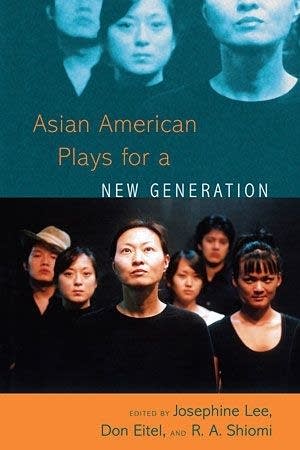Mu Performing Arts publishes anthology of plays

[image]
Later this month (June 29, to be exact) Mu Performing Arts will celebrate the publication of its first book.
Titled "Asian American Plays for a New Generation," it contains scripts for seven productions, six of which were developed by Mu Performing Arts.
Artistic Director Rick Shiomi says it was Josephine Lee, Professor of English and Asian American Studies at the University of Minnesota who convinced them they had a book.
Create a More Connected Minnesota
MPR News is your trusted resource for the news you need. With your support, MPR News brings accessible, courageous journalism and authentic conversation to everyone - free of paywalls and barriers. Your gift makes a difference.
As soon as she mentioned she had a contact with Temple University Press, we realized how important this could be for Mu. We put together a list of plays that Mu had been involved in the development and production of and she added a few that she was interested in but that were not directly connected to Mu (e.g. Indian Cowboy by Zaraawar Mistry). There was of course some shuffling of titles for various reasons (some playwrights felt the plays we were interested in were not ready for publication, some felt that they simply didn't want their plays in the anthology for their own reasons etc and some we went back and forth on about whether to include for our own reasons). But when the dust settled we submitted our list of plays to the publisher and its readers gave our collection the thumbs up.
We realized that with six of the seven plays developed and given world premieres by Mu, that this could be a major statement about Mu's work over the past five years.
Indeed, in a recent review Star Tribune theater critic Graydon Royce wrote:
Some day we will look back on these days as the golden era of Mu Performing Arts. That shouldn't assume some future collapse, but in years hence the mind will fondly recall that group of Asian-American actors who cemented Mu's place in the Twin Cities theater ecology.
Shiomi says there are other collections out there of Asian-American plays, but none that are so closely related to the work of one theater company.
Most anthologies are edited by an individual writer selecting plays by a range of playwrights with very little relation in terms of development and production. And in this age when many playwrights are crying about the lack of development leading to production in the theater community in general, Mu stands out in a rather remarkable way.
Shiomi says he hopes theater professionals will be interested in using the anthology as a resource, but sees universities and academic libraries as the primary market for the book.
One of the common complaints for college professors is that it's hard to get a hold of Asian American scripts by other than the major playwrights like David Hwang, Philip Gotanda, Velina Houston and Chay Yew because so few are published. The generation of writers after them is starting to get published like Julia Cho, Michael Golamco and Lauren Yee, but that's just starting.
There are at least two dozen established companies in the United States producing Asian American theater. They're holding a major conference in Los Angeles next week.
In addition, Shiomi says more mainstream companies starting to produce Asian American plays:
Like African American and Latino American plays, Asian American plays are gaining more recognition and acceptance in the general theater world but it's been an uphill struggle. I see MU as part of the changing face of America, where diversity is becoming an everyday reality, not a special program anymore and that people are starting to live it rather than talk about it. It's a long way to Tipperary but at least we're heading in the right direction, and on the right side of history.
Shiomi says with the publication of the new anthology, Mu Performing Arts hopes to make Asian American plays more accessible to professionals in the field.
Before being contacted by co-editor Josephine Lee, Shiomi thought it unlikely his company would ever be able to publish the plays it had helped create. But now having successfully published this first collection, the staff is already thinking about future publications.